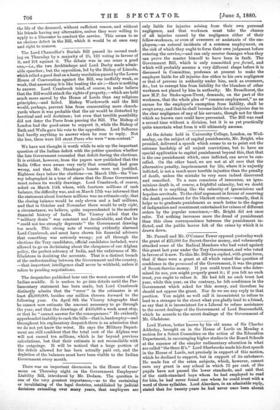There was an important discussion in the House of Com-
mons . on Thursday night on the Government Employers' Liability Bill, introduced by Mr. Dodson. The question is one. of the very greatest importance,—as to the sustaining or invalidating of the legal doctrine, established by judicial decisions extending over many years, that employers are only liable for injuries arising from their own personal negligence, and that workmen must take the chance of all injuries caused by the negligence either of their fellow-workmen, or even of overseers or assistants of the em- ployers,--as natural incidents of a common employment, on the risk of which they ought to form their own judgment before entering the service,—and can only recover damages when they can prove the master himself to have been in fault. The Government Bill, which is only committed pro forma', and which will probably assume a very different shape before it is discussed in Committee, professes at present to make the employer liable for all injuries due either to his own negligence or that of persons in authority under him, such as overseers, &c., but to exempt him from liability for the blunders of other workmen not placed by him in authority. Mr. Broadhurst, the new M.P. for Stoke-upon-Trent, demands, on the part of the workmen, that the whole plea of "common employment," as an excuse for the employer's exemption from liability, shall be swept away, and that he shall become liable for all injuries due to, the clear negligence of any of his servants, though not for those which no known care could have prevented. The Bill was read a second time without a division, but it is as yet practically quite uncertain what form it will ultimately assume.


































 Previous page
Previous page